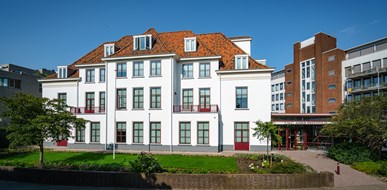Excellent midterm review for the T.M.C. Asser Instituut
Published 30 March 2021
@ Hilko Visser. The T.M.C. Asser Instituut in The Hague.
An independent committee of experts has given a highly positive evaluation of the research quality, the societal outreach and relevance, and the viability of the T.M.C. Asser Instituut. In its report, the committee writes: ‘[T]he Asser Institute has been more than successful at its ambitions in the combined fields of research and societal outreach, and is firmly positioned for a successful future. This is clearly the result of clear vision and a great deal of hard work of all involved.’
The period under assessment, 2016-2019, has been a period of transition for the T.M.C. Asser Instituut. The central objective, set by a new board in 2015, was to become an academic research institute, which critically contributes to the development of international and European law by conducting more fundamental research as well as by increasing its number of high-quality academic publications in leading journals. Other objectives were to increase external funding for research, and to enhance its national and international visibility.
The committee, chaired by Prof. Barbara Oomen (Utrecht University), finds that this transition has been managed ‘very successfully’. It writes that ‘[t]he Asser Institute is now an academic research institute on international and European law, that has the standing to compete with the best and largest departments on international and European law at law faculties in the Netherlands.’.
‘Excellent publications’
In the period under assessment, the aim to publish in leading and peer reviewed international and European law journals has been met successfully, according to the committee, which further notes the dynamic research culture of the Institute and its enhanced international reputation through the output of high-level scholarship and strategic international alliances. The great many memberships in editorial boards further underscore the standing of Asser researchers. The committee writes: ‘In the period under assessment, the researchers of the Asser Institute have produced a significant number of excellent publications. Given the research energy present at the institute it seems likely that this will only continue and further increase in the years to come.’
High societal relevance
The committee has rated the Asser Institute’s societal relevance as ‘very good’. It further finds that the Institute has been successful in obtaining funding for cutting-edge research projects: ‘As a result of successful acquisition, there are a large amount of high-quality projects with great academic output as well as high societal relevance, which is immensely impressive for a medium-size research institute.’ With regard to the viability of the Institute, the committee concludes that the Asser Institute is ‘well on track in ensuring its mid- and long-term viability’ and it assesses the Asser Institute leadership as ‘excellent’.
The committee also notes that the new and central focus on academic research has greatly complemented the Institute’s other tasks, such as serving as an ‘inter-university platform’ for research cooperation of all Dutch law schools; its educational and capacity-building activities and the organisation of events in its outreach strategy.
Confidence
Chairperson of the executive board and academic director Janne E. Nijman is pleased with the positive evaluation: ‘It provides us with confidence and with valuable input for the future, as we carry on developing the T.M.C. Asser instituut as an institute of excellent legal research and continue to advance the societal value of our work. While we will have to celebrate this online rather than together at the Institute, I am positive this will be an energy booster for the Asser colleagues who have worked hard to get where we are’.
About the midterm review
Publicly funded university research in the Netherlands is evaluated every six years, using the national Standard Evaluation Protocol (SEP 2015-2021), as established by the Association of Universities in the Netherlands (VSNU), the Royal Netherlands Academy of Arts and Sciences (KNAW) and the Netherlands Organization for Scientific Research (NWO). The key assessment criteria are research quality, relevance to society and viability (the extent to which the unit is equipped for the future). In between evaluations, institutes may wish to carry out a mid-term review. The aim of this midterm review was to assess whether, and to what extent, the objectives of the Strategic Plan 2016-2020 and the Asser Strategic Research Agenda 2016-2020, both aiming at strengthening the research profile of the institute, were realised. The review committee consisted of Prof. Dr Larissa van den Herik (Leiden University), Prof. Dr Ben Smulders (European Commission) and the chair, Prof. Barbara Oomen (Utrecht University).
Read the full review here.
